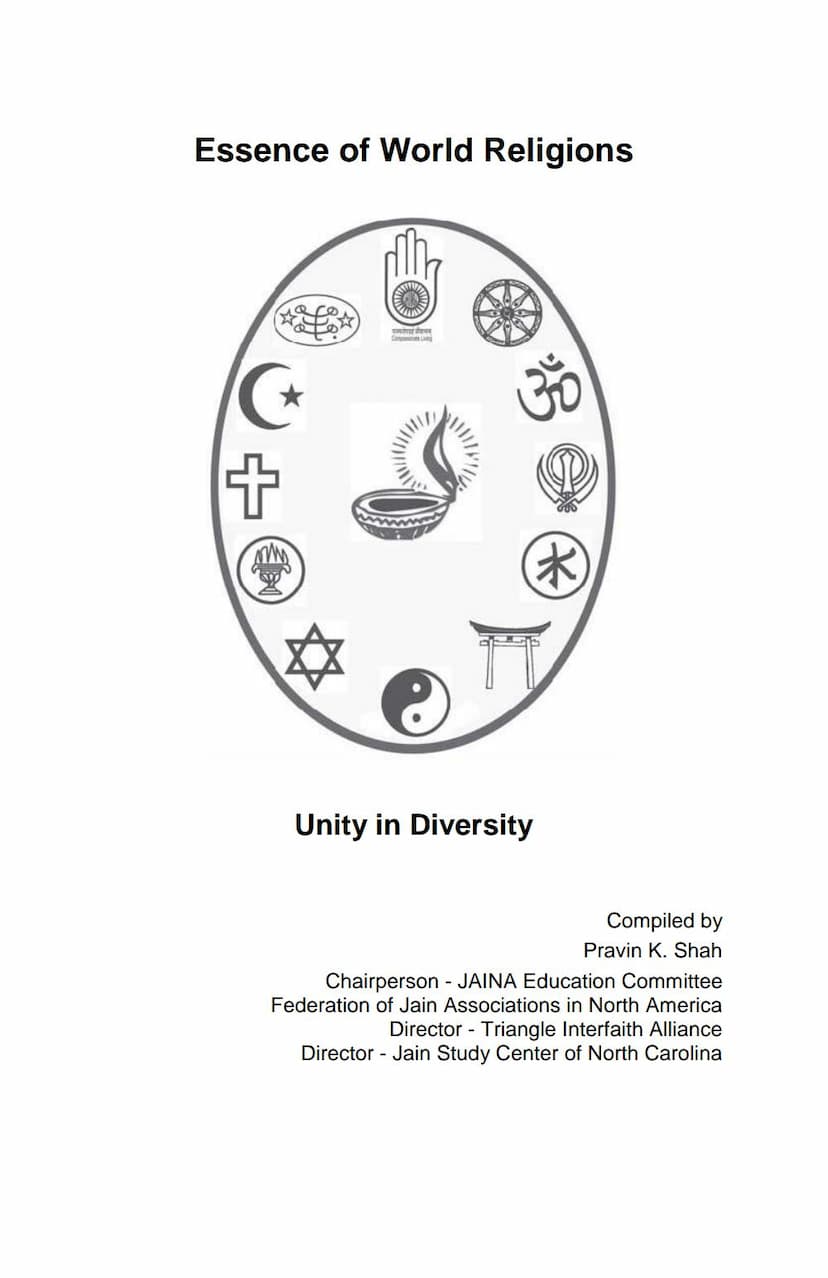JES 911 Essence Of World Religions Reference Book
Added to library: September 1, 2025

Summary
This document is an excerpt from the book "$JES 911 Essence of World Religions Reference Book" compiled by Pravin K. Shah, published by the JAINA Education Committee. The book aims to provide a simple summary of major world religions, highlighting their similarities and differences, to foster a better understanding of Jain principles and ethics.
The book covers religions from three main geographical regions:
Religions of South Asia (India):
- Hinduism: The oldest living religion with no human founder, often called Sanatana Dharma. It emphasizes the spiritual essence of life and has diverse expressions. Its scriptures include the Vedas, Upanishads, and Bhagavad Gita. Hinduism has four main denominations (Shaivism, Shaktism, Vaishnavism, Liberalism) and its goal is Moksha (liberation) from the cycle of rebirth. It teaches the concept of Karma and reincarnation, and the existence of a Supreme Being with various manifestations.
- Buddhism: Founded by Gautama Siddhartha (Buddha) around 2,500 years ago. Its main scriptures are the "Tripitaka" and "Sutras." The two major sects are Theravada and Mahayana. The primary goal is Nirvana, the cessation of suffering, achieved by following the Noble Eightfold Path. Buddhism does not believe in a creator God.
- Jainism: One of the oldest living religions, predating recorded history. Its teachings were revived by Lord Mahavir. Its scriptures are the Jain Agam Sutras. The two main sects are Digambar and Shvetambar. The goal is to become a perfected soul (Siddha) through Right Faith, Right Knowledge, and Right Conduct, emphasizing non-violence (Ahimsa), non-absolutism (Anekäntaväda), and non-possessiveness (Aparigraha).
- Sikhism: Founded about 500 years ago by Siri Guru Nanak. The main scripture is "Adi Granth" (Guru Granth Sahib). The goal is Moksha (union with God). Sikhs stress the unity of God, brotherhood of man, rejection of caste, and the importance of devotion and service. Key practices include meditation on God's name and adherence to the "Five K's."
Religions of the Far East:
- Confucianism: Began 2,500 years ago in China, founded by Confucius. Its scriptures include "The Analects." It focuses on creating nobility through education and virtue, emphasizing proper relationships, social harmony, and ethical conduct.
- Taoism: Originated in China around 2,500 years ago, attributed to Sage Lao Tzu. The "Tao Te Ching" is its main scripture. It emphasizes living in harmony with the Tao (the Way), naturalness, and "wu wei" (actionless activity). It focuses on intuition and spontaneity.
- Shintoism: The indigenous religious tradition of Japan with no historical founder. It reveres supernatural holy powers called Kami. The goal is to achieve a proper relationship with these beings through observance of taboos and purification. Shinto emphasizes the sacredness of nature and ancestral beings.
Religions of the Middle East (West):
- Judaism: Began about 3,700 years ago, with Abraham as the founding father and God's covenant with Moses. Its scriptures include the Hebrew Bible (Torah). The goal is strict obedience to God's law. Judaism emphasizes strict monotheism, the concept of a chosen people, and hallowing daily existence.
- Zoroastrianism: Founded 2,600 years ago in Persia by Prophet Zoroaster. Its scripture is the Zend Avesta. The goal is a place in heaven with God (Ahura Mazda). It emphasizes a moral struggle between good (Ahura Mazda) and evil (Angra Mainyu), with truth and ethical living as paramount virtues. Fire is a central symbol.
- Christianity: Began about 2,000 years ago based on the teachings of Jesus Christ. Its scriptures are the Old and New Testaments. The goal is eternal life with God in heaven. Christianity centers on the belief in Jesus as the Son of God, his crucifixion and resurrection for the forgiveness of sins. It emphasizes faith, love, and good conduct.
- Islam: Founded about 1,400 years ago by Prophet Mohammed. Its scripture is the Qur'an. The goal is to enjoy eternal life in paradise with Allah (God). Islam means submission to Allah's will, emphasizing absolute monotheism, the five pillars of faith, and the Sunnah (teachings and practices of Mohammed).
- Bahá'í Faith: Founded in 1844 by Baháʼu'lláh. It emphasizes the oneness of God, the oneness of religion, and the oneness of humankind. Its goal is to bring about the unity of mankind and world peace. It promotes good character, prayer, meditation, and service to humanity, and advocates for the elimination of all prejudice.
The book also includes a summary of South Asian and Middle Eastern religions, highlighting key differences in their understanding of the universe, God, the afterlife, and the path to salvation. It concludes with quotations and a bibliography. The overall aim is to promote interfaith understanding and highlight the common threads of humanity's spiritual quest.